CAA News Today
CAA Signs on: AHA Releases Statement on Threats to Academic Conferences
posted by CAA — September 15, 2021
Read the PDF: Dismantling conference statement
The AHA has released a statement condemning the harassment and intimidation of participants, organizers, and university sponsors of the virtual conference “Dismantling Global Hindutva: Multidisciplinary Perspectives.” “Conferences, both in person and across digital platforms, are critical to the exchange of ideas among historians and our colleagues in other disciplines,” the AHA wrote. “Disruptions to a conference represent an assault on the principle of academic freedom, and the AHA stands unequivocally with participants in this conference and its sponsors in their right to exchange ideas without fear of threats and intimidation.”
To date, 15 organizations have signed onto this statement.
Meet the 2020 Professional Development Fellows
posted by CAA — April 19, 2021
CAA is pleased to announce the recipient of the 2020 Professional Development Fellowships. The recipient of the $10,000 fellowship in visual art is Ana Maria Farina, SUNY New Paltz. A fellowship in art history was not awarded this year.
The honorable mention in visual art is awarded to Sabrina Pastard, Columbia College Chicago. All fellows and honorable mentions receive a complimentary one-year CAA membership and registration for the 2022 Annual Conference in Chicago.
2020 PROFESSIONAL DEVELOPMENT FELLOWSHIP IN VISUAL ARTS
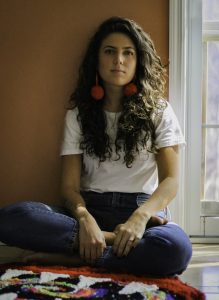
Ana Maria Farina, SUNY New Paltz
Ana Maria Farina paints using a gun––a tufting gun––along with needles, hooks, and knots. Repurposing a phallic signifier of violence, she conjures vibrant objects of comfort that inhabit a mystical pictorial space between abstraction and representation.
Ana Maria was born and raised in Brazil and is now based in the Hudson Valley, New York. She received her masters degree in Art and Art Education from Columbia University in 2016, and in 2018 she was awarded a fellowship to the New York Foundation for the Arts Immigrant Artist Mentoring Program. In 2019, she received a scholarship to attend the MFA program at SUNY New Paltz, where she also served as the Visiting Artist Director and Instructor of Record. Ana’s work has been featured in many spaces throughout New York and she has upcoming exhibitions at the Wassaic Project, the Garrison Art Center, the Dorsky Museum, among others.
HONORABLE MENTION IN VISUAL ART
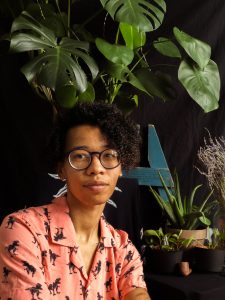
Sabrina Pastard, Columbia College Chicago
Sabrina Pastard is a visual artist who works with the poetics in the meta of the mundane. Often balancing her visuals on the borderline of familiarity and the abject, safety and crisis. Her multidisciplinary practice ranges in medium from ready-made sculptures and abstract prints to conceptual writings and poetry. Each new work invites an intellectual intimacy from the viewer as it inquires to the status of our assumed lives and societal taboos. Pastard was raised in St. Louis, MO and received her B.A. in studio art from George Fox University. She currently resides in Chicago and will complete her MFA at Columbia College Chicago in May 2021.
ABOUT THE PROFESSIONAL DEVELOPMENT FELLOWSHIP
CAA’s Professional Development Fellowship program supports promising artists and art historians who are enrolled in MFA and PhD programs nationwide. Awards are intended to help them with various aspects of their work, whether for job-search expenses or purchasing materials for the studio. CAA believes a grant of this kind, without contingencies, can best facilitate the transition between graduate studies and professional careers. The program is open to all eligible graduate students in the visual arts and art history. Applications for the 2021 fellowship cycle will be due December 15, 2021. Learn more.
Announcing the CAA 2021 Keynote Speaker: Skawennati
posted by Allison Walters — December 21, 2020

Skawennati as xox
We’re delighted to announce that the Keynote Speaker for the 109th CAA Annual Conference will be Skawennati, who will address the membership during Convocation.
Skawennati makes art that addresses history, the future, and change from her perspective as an urban Kanien’kehá:ka (Mohawk) woman and as a cyberpunk avatar. Her early adoption of cyberspace as both a location and a medium for her practice has led to groundbreaking projects such as CyberPowWow and TimeTraveller™. She is best known for her machinimas—movies made in virtual environments—but she also produces still images, textiles and sculpture.
Her works have been presented in Europe, Oceania, China and across North America in exhibitions such as “Uchronia I What if?”, in the HyperPavilion at the 57th Venice Biennale; “Now? Now!” at the Biennale of the Americas; and “Looking Forward (L’Avenir)” at the Montreal Biennale. They are included in the collections of the National Gallery of Canada, the National Bank of Canada and the Musée d’art contemporain de Montréal, among others. She was honoured to receive the 2019 Salt Spring National Art Prize Jurors’ Choice Award and a 2020 Smithsonian Artist Research Fellow. Skawennati is represented by ELLEPHANT, and her work is viewable at skawennati.com.
Skawennati has been active in various communities. In the 80s she joined SAGE (Students Against Global Extermination) and the Quebec Native Women’s Association. In the 90s she co-founded Nation to Nation, a First Nations artist collective, while working in and with various Indigenous organizations and artist-run centres, including the Native Friendship Centre of Montreal and Oboro. In 2005, she co-founded Aboriginal Territories in Cyberspace (AbTeC), a research-creation network whose projects include the Skins workshops on Aboriginal Storytelling and Digital Media as well as the Initiative for Indigenous Futures. Throughout most of the teens, she volunteered extensively for her children’s elementary school, where she also initiated an Indigenous Awareness programme. In 2019, she co-founded centre d’art daphne, Tiohtià:ke/Mooniyang/Montreal’s first Indigenous artist-run centre.
Born in Kahnawà:ke Mohawk Territory, Skawennati belongs to the Turtle clan. She holds a BFA from Concordia University in Montreal, where she resides.
Convocation will be held on Wednesday, February 10, 2021, 4:30-6:00 pm EST. Access to Convocation requires free registration for “Free and Open Sessions” and is included in paid registration.
CAA 2021 Artists’ Interviews: Polly Apfelbaum interviewed by David Pagel
posted by Allison Walters — December 11, 2020
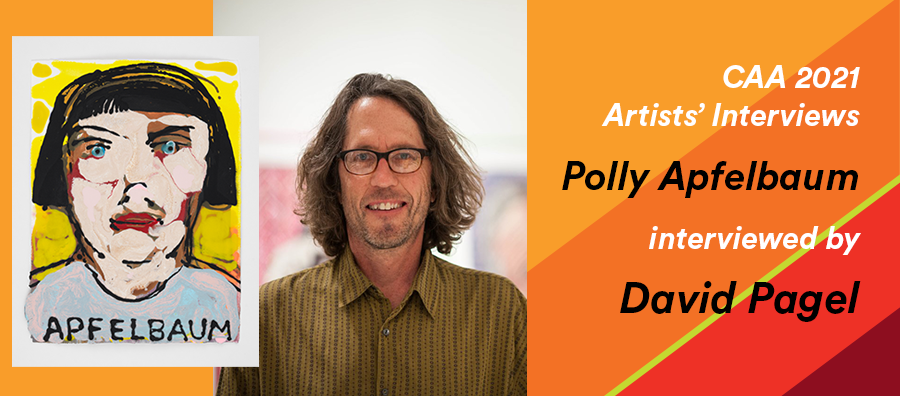
Polly Apfelbaum, image credit: Nicole Eisenman, Apfelbaum, 2019, Paper pulp drawing, Paper dimensions: 30 1/2 x 22 1/2 in, Courtesy the artist and Anton Kern Gallery.
David Pagel.
We are excited to announce that one of this year’s Artists’ Interviews will feature Polly Apfelbaum, interviewed by David Pagel.
Beginning in 1997, the Annual Artists’ Interviews were established to provide the opportunity for esteemed artists to have one-on-one conversations with colleagues at the Annual Conference.
Each year, the Services to Artists Committee identifies two distinguished artists to participate. The interviews, held as part of the Services to Artists Program, provide a unique opportunity for members to hear insights from artists in dialogue with the interviewer. Access to this program content requires free registration for “Free and Open Sessions” and is included in paid registration. This year’s Artists’ Interviews are supported by a generous grant from the NEA.
Speaker Biographies
New York-based artist Polly Apfelbaum’s (b.1955) work has situated itself as a hybrid of painting, sculpture, and installation over a career spanning 30-plus years. Exploring the intricacies of color, Apfelbaum weaves her way, both literally and conceptually, through ideas of Minimalism, Pop aesthetics, and Color Field painting to blur the lines between two-and three-dimensional art making. Apfelbaum graduated from the Tyler School of Art, Elkins Park, Pennsylvania. She has exhibited consistently since her first solo show in 1986. Her work has recently been recognized with a Pew Center for Arts Grant, a Creative Capital Award, and the 2012 Rome Prize at the American Academy. She has also received a Joan Mitchell Grant, The Diebenkorn Fellowship, a Pollock-Krasner Foundation Grant, an Anonymous Was a Woman Grant, and a Guggenheim Fellowship.
Recent solo exhibitions include: “Waiting For the UFO’s (a space between a landscape and a bunch of flowers)” at the Kemper Museum, Kansas City, and the Ikon Gallery, Birmingham, UK (2019); “Haystack Hands” at Haystack Mountain School of Craft, Deer Isle, ME; “Happiness Runs” at Belvedere 21, in Vienna, Austria (2018); “Dubuffet’s Feet, My Hands” at Frith Gallery, London, UK (2017); “The Potential of Women” at Alexander Gray Associates, New York, NY (2017); “Face (Geometry)(Naked) Eyes,” Otis College of Art and Design, Los Angeles, CA (2016); and “Deep Purple, Red Shoes,” Be-Part, Waregem, Belgium (2015). She is represented in numerous collections including: Brooklyn Museum of Art, Brooklyn, NY; Carnegie Museum of Art, Pittsburgh, PA; Dallas Museum of Art, Dallas, TX; Los Angeles County Museum of Art, Los Angeles, CA; Museum of Modern Art, New York, NY; Philadelphia Museum of Art, Philadelphia, PA; Whitney Museum of American Art, New York, NY.
David Pagel is an art critic who lives in Los Angeles and regularly contributes to the Los Angeles Times. He is a professor of art theory and history at Claremont Graduate University and an adjunct curator at the Parrish Art Museum in Water Mill, NY, where he has organized “Telling Stories: Changing the Narratives” (2020) and “Unfinished Business: Paintings from the 1970s and 1980s by Ross Bleckner, Eric Fischl and David Salle” (2016).
Recent publications include “Jim Shaw” (Lund Humphries, 2019) and “Talking Beauty: A Conversation Between Joseph Raffael and David Pagel About Art, Love, Death, and Creativity” (Zero+, 2019). An avid cyclist, he is a seven-time winner of the California Triple Crown.
Apfelbaum and Pagel’s pre-recorded conversation will be available starting on February 5, 2021. They will host a live online Q&A on Friday, February 12 at 5:30pm EST.
Apply to Join the CAA Council of Readers
posted by Allison Walters — December 10, 2020
In preparation for the spring submission cycle for the 2022 Annual Conference, the Annual Conference Committee will appoint up to 22 new members to the Council of Readers. Council members read and rate session and presentation proposals and serve a crucial role in the review process for the Annual Conference.
Over 950 proposals are submitted for review each year for selection to the conference program. Each proposal is read by three Council members. By providing their time, knowledge, and expertise of their fields, the council helps to shape the conference program. Each member of the Council reviews up to 60 proposals per year from across CAA’s fields of study and as much as possible from within their self-identified scholarly focus and knowledge. Most proposals include one 250-word abstract, while complete session submissions can include 4-5 abstracts (1250 words). Each reader receives a similar amount of content.
Requirements for Readers
- Current CAA membership
- Time commitment to read and review no more than 60 proposals online in May-June 2021
- Ability to participate as a Council of Readers member for up to three years
- Readers are required to read and abide by CAA’s Statement on Conflict of Interest and Confidentiality
- Abbreviated CV uploaded to online form
- Completed online form
Application deadline: February 25, 2021
More details:
- The Council of Readers is a group of 50 to 75 CAA members from Professional Committees, Affiliated Societies, and general membership overseen by the Annual Conference chair.
- Readers will be asked to review proposals from across CAA’s fields of study, and as much as possible from within their self-identified scholarly focus. Readers with broad areas of interest are encouraged to participate.
- The proposals will be distributed in early May and must be completed by mid June.
- Readers will access abstracts and complete their reviews in our online system, with orientation and support from the Annual Conference Committee and CAA staff members.
- Each proposal is read and reviewed in the online portal by three different Council members.
- The majority of proposals include a single 250-word abstract, while complete session submissions can include 4-5 abstracts (1250 words).
- Readers will review no more than 60 proposals each, with proportional share of abstracts.
- For each proposal, Readers will use a scale of 1-5 to answer five questions and also enter a short comment for the Annual Conference Committee’s review.
- Members of the Council of Readers serve a three-year term on a rotation so that each year, one third of the council is new.
- The Council of Readers does not meet together in person or electronically.
- After proposals are read and reviewed by the Council, the chair reports to the Annual Conference Committee on session topics, including identifying possible areas of content that are missing from the submissions received.
- The chair finalizes the conference content based on the reviewed submissions.
Please email programs@collegeart.org with any questions.
CAA 2021 Artists’ Interviews: Alan Michelson interviewed by David Joselit
posted by Allison Walters — December 07, 2020
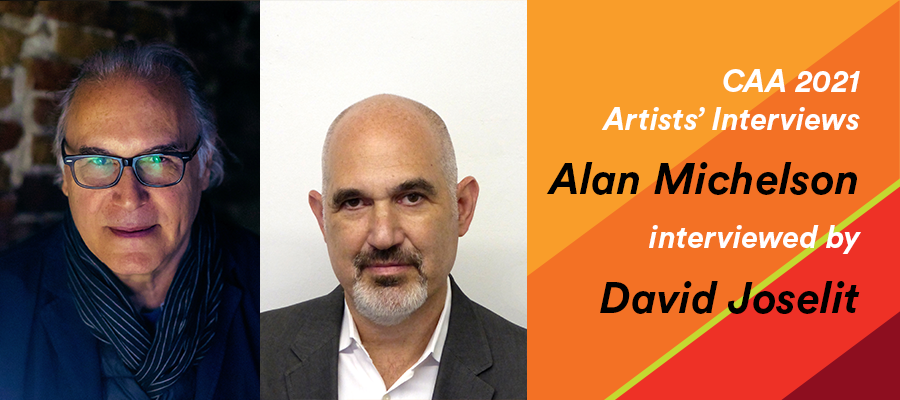
Alan Michelson, photo: Karolina Sobel. David Joselit, photo: Mary Ellen Carroll.
We are pleased to announce that one of this year’s Artists’ Interviews will feature Alan Michelson, interviewed by David Joselit.
Beginning in 1997, the Annual Artists’ Interviews were established to provide the opportunity for esteemed artists to have one-on-one conversations with colleagues at the Annual Conference.
Each year, the Services to Artists Committee identifies two distinguished artists to participate. The interviews, held as part of the Services to Artists Program, provide a unique opportunity for members to hear insights from artists in dialogue with the interviewer. Access to this program content requires free registration for “Free and Open Sessions” and is included in paid registration. This year’s Artists’ Interviews are supported by a generous grant from the NEA.
Speaker Biographies
Alan Michelson is an internationally recognized New York-based artist, curator, writer, lecturer and Mohawk member of the Six Nations of the Grand River.
For over thirty years, he has been a leading practitioner of a socially engaged, critically aware, site-specific art grounded in local context and informed by the retrieval of repressed histories. Recent exhibitions include Alan Michelson: Wolf Nation, Whitney Museum of American Art, Volume 0, Zuecca Projects, Venice, and Citizenship: A Practice of Society, MCA Denver.
His work is in the permanent collections of the Whitney Museum of American Art, the National Gallery of Canada, the Smithsonian National Museum of the American Indian, and the Art Gallery of Ontario. His essays have recently appeared in Frieze and October.
Public art is also part of his diverse practice, and Mantle, his large-scale monument honoring Virginia’s Indian nations was dedicated at the capitol in Richmond in 2018.
Michelson is co-founder and co-curator, with the Vera List Center for Art and Politics at the New School, of the groundbreaking Indigenous New York series.
David Joselit is Professor of Art, Film, and Visual Studies at Harvard. Joselit is author of Infinite Regress: Marcel Duchamp 1910-1941 (MIT, 1998), American Art Since 1945 (Thames and Hudson, 2003), Feedback: Television Against Democracy (MIT, 2007), and After Art (Princeton University Press, 2012). He co-organized the exhibition, “Painting 2.0: Expression in the Information Age,” which opened at the Brandhorst Museum in Munich in 2015.
Joselit is an editor of the journal OCTOBER and writes regularly on contemporary art and culture. His most recent book is Heritage and Debt: Art in Globalization (MIT Press 2020).
Michelson and Joselit’s pre-recorded conversation will be available starting on February 5, 2021. They will host a live online Q&A on Friday, February 12 at 4:30 pm EST.
Notice of CAA 109th Annual Business Meeting
posted by Allison Walters — December 04, 2020
College Art Association
Notice of 109th Annual Business Meeting
Friday, February 12, 2021
2:00 p.m. EST
The 109th Annual Business Meeting of the members of the College Art Association will be called to order at 2:00 p.m. EST on Friday, February 12th at the 2021 Annual Conference. Access to this meeting requires free registration for “Free and Open Sessions” and is included in paid registration. Once you have registered, please log into the online conference portal to attend the meeting.
CAA President, N. Elizabeth Schlatter will preside.
AGENDA
- Welcome / Call to Order – N. Elizabeth Schlatter, CAA President
- Executive Director’s Report – Meme Omogbai
- Approval of Minutes of 108th Annual Business Meeting, held in two parts, February 12 and February 14, 2020 [ACTION ITEM] See CAA 108th Annual Business Meeting Minutes.
- Financial Report: Robert Tofolo, Chief Financial Officer
- Old Business
- New Business
- Results of Election of New Directors – N. Elizabeth Schlatter, CAA President
- Adjournment
Proxies
If you are unable to attend the Annual Business Meeting, kindly complete a proxy online to appoint the individuals named thereon to (i) vote, as directed by you, for directors, and, at their discretion, on such other matters as may properly come before the Annual Business Meeting; and (ii) vote on any and all adjournments thereof. CAA Members will be notified when the proxy for casting votes becomes available — online in late December 2020. A proxy, with your vote for directors, must be received no later than 6:00 p.m. EST Thursday, February 11th, 2021.
Next Meeting – 2022
The 110th Annual Business Meeting of the College Art Association will be held in Chicago in 2022, precise date to be announced.
Colin Blakely, Secretary
College Art Association
December 10, 2020
CAA Table Talk, November 18, 2020
posted by Allison Walters — November 24, 2020
We’re delighted to introduce CAA members to a new series of conversations between Meme Omogbai, our executive director and CEO, and N. Elizabeth Schlatter, the president of the CAA Board of Directors. Amidst so much change in our lives, workplaces, and world, CAA leadership sat down for an informal chat on how CAA is reshaping its efforts to provide access and resources where members need it most. Meme and Elizabeth will speak on the economic implications of COVID-19, the urgent importance of members’ scholarship, and the changing terrain of this cultural moment.
This discussion is centered around the Annual Conference and CAA’s pivot towards a digital-first platform, inspired by many of the questions submitted by members.
We would love to hear your questions for future CAA Table Talk conversations. Please send them in advance to: caanews@collegeart.org
SPEAKER BIOGRAPHIES
Meme Omogbai is Executive Director and CEO of College Art Association (CAA). Before joining CAA, Omogbai served as a member and past Board Chair of the New Jersey Historic Trust, one of four landmark entities dedicated to preservation of the state’s historic and cultural heritage and Montclair State University’s Advisory Board. Named one of 25 Influential Black Women in Business by The Network Journal, Meme has over 25 years of experience in corporate, government, higher education, and museum sectors. As the first American of African descent to chair the American Alliance of Museums, Omogbai led an initiative to rebrand the AAM as a global, inclusive alliance. While COO and Trustee, she spearheaded a major transformation in operating performance at the Newark Museum. During her time as Deputy Assistant Chancellor of New Jersey’s Department of Higher Education, Omogbai received Legislative acknowledgement and was recognized with the New Jersey Meritorious Service Award for her work on college affordability initiatives for families. Omogbai received her MBA from Rutgers University and holds a CPA. She did post-graduate work at Harvard University’s Executive Management Program and has earned the designation of Chartered Global Management Accountant. She studied global museum executive leadership at the J. Paul Getty Trust Museum Leadership Institute, where she also served on the faculty.
Elizabeth Schlatter is the President of the CAA Board of Directors and Deputy Director and Curator of Exhibitions at the University of Richmond Museums, Virginia. A museum administrator, curator, and writer, she focuses on modern and contemporary art and on topics related to curating and issues specific to university museums. At UR, she has curated more than 20 exhibitions, including recent group exhibitions of contemporary art such as “Crooked Data: (Mis)Information in Contemporary Art,” “Anti-Grand: Contemporary Perspectives on Landscape,” and “Art=Text=Art: Works by Contemporary Artists.” She also serves on and chairs various University and School of Arts & Sciences committees. Prior to the University of Richmond, she worked with exhibitions at the Smithsonian Institution Traveling Exhibition Service (SITES) in Washington, D.C, and in fundraising at the Contemporary Arts Museum, Houston. She is author ofMuseum Careers: A Practical Guide for Novices and Students (Left Coast Press, Inc.) and a contributor to A Life in Museums: Managing Your Museum Career (American Association of Museums). She has a BA in art history from Southwestern University in Texas, and an MA in art history from George Washington University.
2021 Distinguished Scholar: Salah M. Hassan
posted by Allison Walters — November 20, 2020
We’re delighted to announce the Distinguished Scholar session at the 109th CAA Annual Conference will honor Salah M. Hassan.

Salah M. Hassan. Photo: Jason Koski, Cornell University Photography (UREL)
Salah M. Hassan is the Goldwin Smith Professor of African and African Diaspora Art History and Visual Culture in the Department of Africana Studies and Research Center, as well as in the Department of History of Art and Visual Studies, and also serves as Director of the Institute for Comparative Modernities at Cornell University, Ithaca, USA. Hassan is also the Director of The Africa Institute, Sharjah, UAE. Hassan served as Professor of History of Art in African and African American Studies and Fine Art at Brandeis University, where he previously awarded the Madeleine Haas Russell Professorship in the Departments of African and Afro-American Studies and Fine Arts (2016-2017).
Hassan is a founding-editor of Nka: Journal of Contemporary African Art (Duke University Press). He currently serves as a member of the editorial advisory board of Atlantica, Journal of Curatorial Studies, and international Journal of Middle Eastern Studies, and served as consulting editor for African Arts. Hassan has contributed numerous essays to journals, anthologies, and exhibition catalogues of contemporary art, and has guest edited a special issue of SAQ: South Atlantic Quarterly, entitled African Modernism (2010). He has authored, edited, and co-edited several books, including Ibrahim El Salahi: A Visionary Modernist (2013); Darfur and the Crisis of Governance: A Critical Reader (2009); Diaspora, Memory, Place (2008); Unpacking Europe (2001); Authentic/Ex-Centric (2001; Gendered Visions: The Art of Contemporary Africana Women Artists (1997); and Art and Islamic Literacy among the Hausa of Northern Nigeria (1992), among others. Most recently, Hassan edited and introduced Ibrahim El-Salahi: Prison Notebook (MoMA and Sharjah Art Foundation Publications, 2018), and the forthcoming Ahmed Morsi: A Dialogic Imagination (Sharjah Art Foundation, 2020).
Hassan has curated a number of international exhibitions in museums and at major Biennales such as Venice and Dak’Art, including Authentic/Ex-Centric (49th Venice Biennale, 2001), Unpacking Europe (Rotterdam, 2001-02), and 3×3: Three Artists/Three: David Hammons, Maria Magdalena Campos-Pons, Pamela Z (Dak’Art, 2004), among others. He curated Ibrahim El Salahi: A Visionary Modernist was published in 2012 held at The Tate Modern in London (2013) after premiering at the Sharjah Art Museum in Sharjah, UAE (2013). In addition, he also co-curated The Khartoum School: The Making of the Modern Art Movement in Sudan, 1945-2016 (2016-2017) and When Art Becomes Liberty: The Egyptian Surrealists (1938–1965) (2016) funded by the Sharjah Art Foundation.
He is the recipient of fellowships including the J. Paul Getty Postdoctoral Fellowship as well as major grants from Sharjah Art Foundation, Ford Foundation, Rockefeller Foundation, Afrique en Créations, Andy Warhol Foundation for the Visual Arts, and the Prince Claus Fund.
This session will highlight his career and provide an opportunity for dialogue between and among colleagues. The panel will include Dr. Hassan as well as the following: Chika Okeke-Agulu (Princeton University); Elizabeth Giorgis (University of Addis Ababa); and Iftikhar Dadi (Cornell University).
The live online Q&A will be held Thursday, February 11, 2021, 10:30-11:15 am EST.
Call for Participation: CAA 2021 Poster Session Highlighting Undergraduate Research in Art and Art History
posted by CAA — October 05, 2020
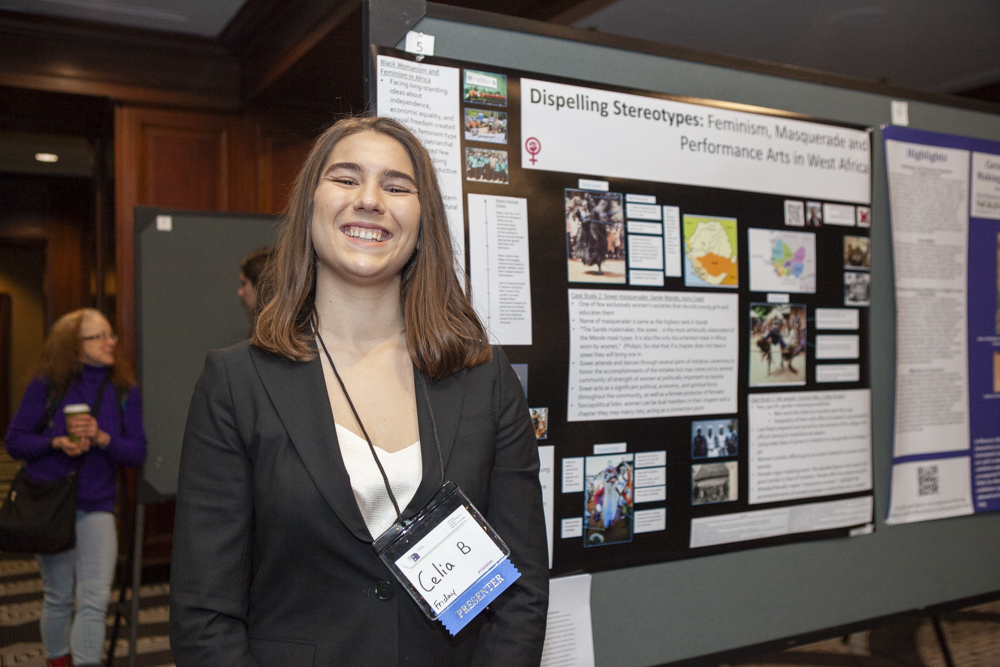
Cecilia Bugno presents her work as part of the inaugural Undergraduate Research Poster Presentations at the 2020 Annual Conference. Photo: Stacey Rupolo
We’re excited to announce the 2021 Call for Participation for a special virtual poster session dedicated to undergraduate research for the 2021 Annual Conference, February 10-13.
Organized by Alexa Sand, Chair of the Division of Arts and Humanities for the Council on Undergraduate Research, and Professor of Art History and Director of Undergraduate Research at Utah State University, this session is one of several events planned for CAA 2021 to provide more opportunities for undergraduate participation.
Submissions should be sent via this google form by November 23, 2020.
Selected presenters will be notified by December 7 and will need to join CAA at the student membership rate prior to participation in the conference. Participants will also be required to register for the conference.
Undergraduate research—whether part of a faculty-directed project, class-based, or an individual pursuit on the part of a student—is an ideal example of active and engaged learning. Students in art history identify questions, evaluate source material, test ideas and theories, and produce reports in some form, usually including a significant written component. In the studio art and design fields, research can take a different form, with creative practice being one way outcomes of a project can be delivered.
This poster session will be dedicated to presenting outstanding examples of undergraduate research. Submissions are invited from students conducting research such as object and/or medium studies, text-based analysis, experimental archaeology, thesis research, and/or creative inquiry. Students may choose to present findings from ongoing research or from recently completed projects.
We also encourage submissions from faculty and museum professionals who have experience with mentoring undergraduate research in Art History, Studio Art, Graphic Design, Visual Communication, and other creative fields. Faculty posters may address specific projects or case studies of student research projects, assessment of undergraduate research, characteristics of successful programs, or other approaches that addresses the challenges and benefits to students of undergraduate research.
This project proposal is part of CAA’s Undergraduate Outreach Initiative organized collaboratively by CAA’s Education Committee, Committee on Diversity Practices, Students and Emerging Professionals Committee, and the Division of Arts and Humanities, Council on Undergraduate Research.
Please contact Alexa Sand directly at alexa.sand@usu.edu with any questions.


